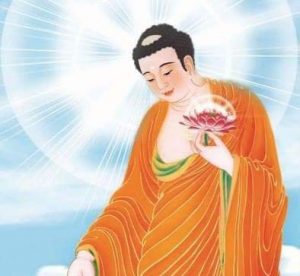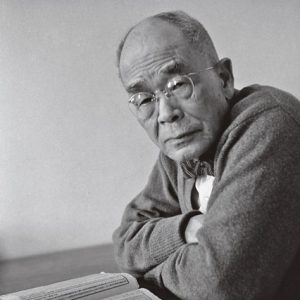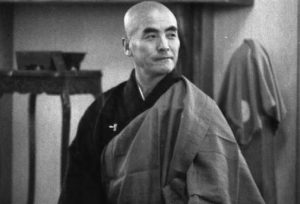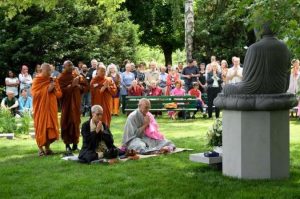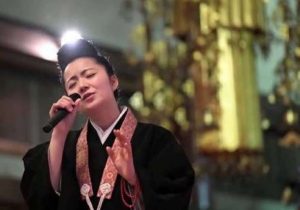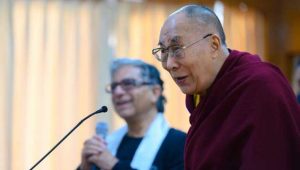Amitabha Buddha’s first 11 vows are addressed to “humans and devas”
All ordinary beings, including humans and devas, attain all the benefits given by Amitabha Buddha unconditionally on their rebirth in the Land of Bliss through Amitabha-recitation. This has been promised in his first 10 vows. In other words, all the splendid rewards in body and buddha-like supernatural powers are obviously do not result from merit and virtues practiced by ordinary beings but result from the pure karma practiced by Amitabha Buddha on their behalf.
The aim of Amitabha Buddha in making vows and practicing acts of immeasurable merit and virtue is to assure all Amitabha-reciters of their rebirth in his land, where they too shall become buddhas.
Let us continue to discuss the 11th Vow of Amitabha Buddha, which states as follows:
If, when I attain Buddhahood, humans and devas in my land should not dwell in the Definitely Assured State and unfailingly reach Nirvana, may I not attain perfect Enlightenment.
This is the last of the first 11 vows, which are addressed to “humans and devas” in the Land of Bliss. But these names are used only because these beings were humans and devas in other worlds before they were reborn in the Pure Land. Using “humans and devas” in the formulation of the vows is for the purpose of drawing the attention of humans and devas suffering in the Six Realms in other worlds.
The meaning of the “Definitely Assured State” in the 11th Vow
“Dwelling in the Definitely Assured State and unfailingly reaching Nirvana” as stated in the 11th Vow is the benefit bestowed on those who are reborn in the Land of Bliss. However, what is meant by “Definitely Assured State”? Actually, the answer is contained within the vow itself, which is “unfailingly reaching Nirvana.”
It also means “unfailingly becoming a buddha,” “unfailingly attaining the perfect Enlightenment,” and so on. “Unfailingly” means “definitely assured” by Amitabha Buddha. There are many other names given to the “Definitely Assured State” in Buddhism. These are: “Assurance of Nirvana,” “State of Non-Retrogression” or avinivartaniya in Sanskrit, and “Perseverance for Non-Arising of Phenomena” or anutpattika-dharma-ksanti in Sanskrit.
The last is the highest level of “perseverance,” one of the Six Paramitas in the bodhisattva practices. Perseverance is to realize that phenomena fundamentally do not arise or cease. Actually, in this state, there is really nothing to be known as “arising” or “ceasing,” “birth” or “death,” since everything is simply just as it is.
The bodhisattva who dwells in this state is regarded as cutting off the birth and death of all mental activities in the mind, also known as the Second Kind of Birth and Death. The first kind is the Staged Birth and Death, which is the reincarnation of the physical body of ordinary beings, life after life.
So, “dwelling in the Definitely Assured State and unfailingly reaching Nirvana” signifies a milestone on the bodhisattva path, which is equivalent to becoming a Bodhisattva of the Eighth Ground. Upon rebirth in the Land of Bliss, these two kinds of birth and death can be resolved or cut off at the same time.
Instantly dwelling in the “Stage of Non-Retrogression” in this lifetime
Nagarjuna Bodhisattva says in his “Chapter of the Path of Easy Practice”:
There are infinite gates by which to access the Buddhist teachings, and these are not unlike taking trips in the world; some are difficult and some easy. If we take a journey overland by foot, it is difficult and painful, but if we take a trip by boat on the open waves, it is easy and joyful.
It is similar in the path of bodhisattvas. Some take on diligent practices with vigor, but others adopt easy practice with faith as an expedient means to reach the state of Avinivartaniya.
Nagarjuna further explains Amitabha’s 18th Vow, based on his classification of the Pure Land teaching as the Path of Easy Practice, as follows:
Amitabha’s Fundamental Vow is as follows: If anyone invokes me, recites my name, and takes refuge in me, he will instantly enter the state of assurance [non-retrogression], and subsequently attain the highest perfect Enlightenment. For that reason, you should always be mindful of him.
As said in the “Text on Accomplishment of the 18th Vow” in the Infinite Life Sutra:
All sentient beings who, having heard his Name, rejoice in faith, remember him even once and sincerely transfer the merit of virtuous practices to that land with the aspiration to be reborn there, will instantly attain rebirth and dwell in the State of Non-Retrogression.
“Instantly,” as stated in the “Text of Accomplishment of the 18th Vow,” implies that “dwelling in the State of Non-Retrogression” is in effect in this present lifetime. So it is not necessary for exclusive Amitabha reciters to wait until after they are reborn in the Land of Bliss to attain the State of Non-Retrogression.
The purpose of Amitabha-recitation is not just seeking rebirth in celestial or human realms
It is important to understand that Amitabha-recitation should not be practiced with the aim of accumulating secular blessings in the present life, or for seeking rebirth in celestial or human realms. It is for “sincerely dedicating and aspiring to be reborn in that Land” to become a buddha. Of course, once one is secure in their aspiration for rebirth, it is not at all forbidden to ask Amitabha’s assistance with worldly matters. In fact, blessings tend to accumulate for one who is dedicated to exclusive Amitabha-recitation.
As long as a sentient being recites Amitabha’s Name once or 10 times, has one thought near the end of life, or recites for the remainder of his life, he will be reborn in Amitabha’s Pure Land. So dwelling in the State of Non-Retrogression is regarded as the great benefit attained in the present life, rather than after rebirth in the Land of Bliss. It is also known as “assured rebirth in the present lifetime,” one of the characteristics of the Pure Land school.
Out of the 48 vows, the 11th Vow, is one of the five Real Vows of Amitabha Buddha. The other four Real Vows are the 12th, 13th, 18th, and 22nd Vows. We will discuss these in the next article.
Related features from BDG
What Kind of Supernatural Powers Will We Have in the Land of Bliss?
What Kind of Body Will We Have in the Land of Bliss?
Does Life End upon Rebirth in the Land of Bliss?



